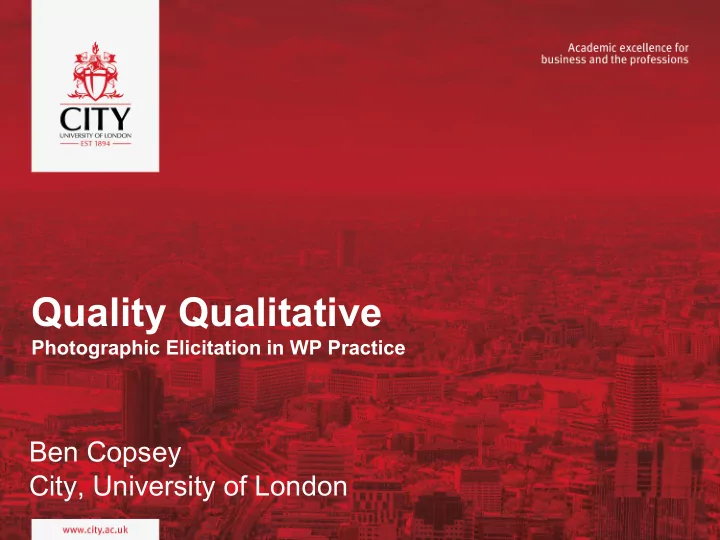

Quality Qualitative Photographic Elicitation in WP Practice Ben Copsey City, University of London
Why do you Evaluate your outreach projects?
What data do you generate? Quantitative Qualitative What do you do with it?
Generating feedback, student data and Evaluate - before and after plots, measurable/discrete long and short term measures information Impact of intervention – better grades, “better” aspiration, more information Store and report – HEAT, end of year reports, Acorn
What we know: Methodological Theoretical Financial repercussions of under- evaluated programmes Data: generated, used, stored, forgotten
Run Intervention Design Programme Evaluate Tinker or programme make cheaper It works! It doesn’t work!
Evaluate Design Tinker or programme It doesn’t Programme make cheaper work! It works! Run Intervention
Evaluation as Confirmation Who owns, controls and uses the knowledge? We ask people to answer our questions Evaluating to produce what we want to hear Student as subject – Yay or Nay and little else!
Grossly simplified examples… Intervention Works? Raises? Why? Tutoring Yes Achievement Because it’s tutoring Campus Visits Yes Aspiration? Exposing students to new environments? Assemblies …yes? Knowledge? ? Lecturer-Led … yes? … aspiration and ? sessions knowledge? We “know” these work – the evaluations say so! – but why?
The Assumption Gap Project Works Our way or OUR way?
My Assumption Gap: Spotlight Days Package of visits, assemblies and class sessions with Primary Schools 5 close partners Large academic-led component 3-6+ visits in Y5, 2-3 interactions Y6
The Spotlight Problem The Quant says it works! (but how reliable are 10-11 year olds?) Limited resources – how much is enough? How much is too much? Do we keep it stable, or expand, make efficiencies, change, redesign? Is primary work long-term effective? Qualitative solutions What do kids remember, talk about and enjoy – what Sticks? We’ve made changes – why have students changed? Involving students in the process - what are they making of all this?
Photo Elicitation: Practice Photos Interview Transcripts Storyboards What is Discourse and Thematic actually going on Visual Why is it Demographic analysis happening?
Photo Elicitation: Theory As Photography:
Visual Analysis Regular visitors Students IN photos Targeted “important” shots Less “clustering” around the impressive This is where I did that thing - stickability Less regular visitors Students not in photos Less targeted, more similar shots Clustered around the eye catching
Regular visitors and WP Student Ambassador images similar in terms of visual – student embedded in Uni contexts, DOING not SEEING
Regular Experience of University One-Off
Visual Analysis – your go! 4 subjects, same topic Who is: The first timer? The committee member? On the same team? ….And please don’t look at the back
Text Analysis Transcript coded by concepts mentioned Codes emerge through close reading Codes created by student discussion
Into the Mind of….. an 11 year old Close nodes show strong relation in student transcript Related concepts Issues raised Thought processes Distant nodes show weaker/no association Branches show concepts associated together into “genera” by participating students
“Negative” “Positive” Concepts Concepts Students Issues Study and Identity Learning Environment 3-4 visits sees “positive” language used for more core concepts Worry replaced with excitement – eg challenge rather than issue
“Spotlight tells kids what Uni is” What they conclude What they say they do Learning Learn about about this I am University is fun and welcome interesting here Subject workshops Ambassadors I am a are awesome Student Time with Ambassadors University I want to go is different See to University from University school
Operationalising our Results I am a Student Closely related concepts encourage students to Opportunity access our aims and goals What can we do on their own terms with this? Greater pressure to They arrive at conclusions – maintain how can we help them? across KS3 ? Familiarity and high frequency I want to go to University Continuity of Minimal impact of people, Academic spaces and I am sessions events welcome here Ambassadors
A Co-Designed Spotlight Ambassadors: workshops, play and continuity Site: consistent rooms, staff, welcome, ID cards and playtime Kit: student led engagement – notebooks not worksheets Challenge, Personal Relationships and Mutual Respect
Qualitative - Creative and Student Led Qualitative feedback lets us investigate the missing WHY without imposing OUR why Qualitative evaluation allows us to learn from students how to deliver better programmes Qualitative is not as scary as it might seem!
Qualitative is: Analysed by: Inductive process, data Non-numeric guides questions Category based Causal Deductive process, (often) Personal questions applied to data Or ….“Adding it to the quote file” – my usual approach Collected through: Interview Focus group Observation Text analysis Discussion Long-term approaches
What Qualitative data do you generate? What do you do with it? Do you feel as confident turning it in to something reportable/publishable/OfS/NCOP approved?
How to do qual analysis Sounds complex but: You already do it! You generate it regularly You already think about it – start to talk about it! Identify expertise Experiment with software, research and method NCOP/OfS suitability Internal reporting Step by step
GOADing your issue into Action Get your data – what are you looking G enerate for? Are you inductive or deductive? What time and resource do you have? Data is nothing without context! O rganise Categories, groups and cross comparison What can you do? A nalyse What method of analysis works for you? Maybe experiment first, find out WHY after (the maverick approach!) Operationalise! Solid GOA allows you to find new D o ways to Do what you do!
With regards to evaluation, it’s all about finding out…. “____works” what how why Answering “what works” is just the start of a more interesting process – use your qualitative to take the next steps!
Thanks! Ben Copsey – Ben.Copsey@city.ac.uk
Recommend
More recommend